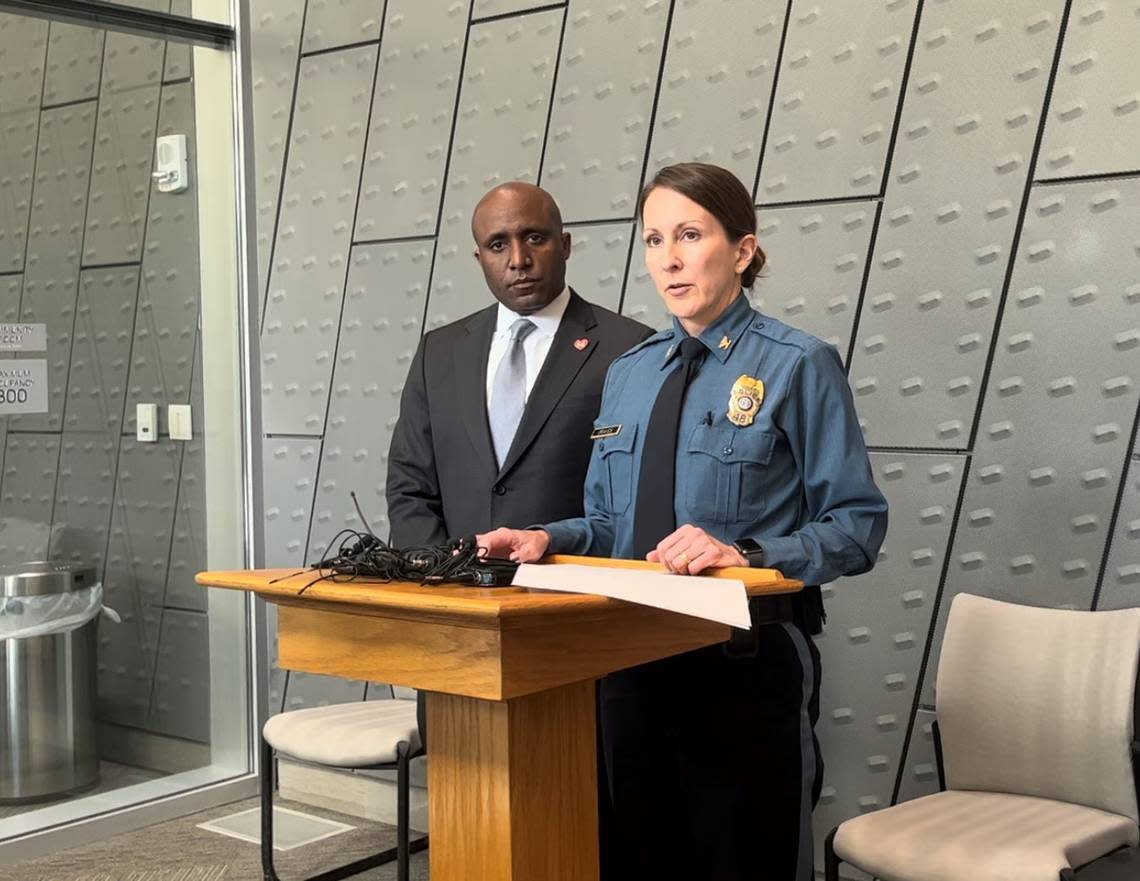Kansas City could raise maximum pay for police after Missouri lawmakers pass bill

- Oops!Something went wrong.Please try again later.
- Oops!Something went wrong.Please try again later.
The Kansas City Police Department would gain more control over how much it pays its police chief and officers under a measure Missouri lawmakers sent to Gov. Mike Parson on Thursday as part of a sweeping public safety bill.
The Missouri Senate approved the bill on a vote of 30-4, after the House previously passed it 109-11.
The measure removes the maximum salary cap for the city’s police chief and its officers in an effort to attract and retain more officers. It also removes the requirement that applicants for chief be under 60 years of age and allows the police board to establish a salary range for officers.
Removing the salary cap for Kansas City police has received support from both parties this year as the department lags behind other cities in how much it pays chiefs and officers. The salary problem has been compounded by the city’s unusual lack of control of its police.
“It’s just the right thing to do,” Sen. Tony Luetkemeyer, a Parkville Republican and sponsor of the legislation, said Thursday. “We need more officers out on the streets.”
Kansas City is the only city in Missouri that does not control its police force. The department is overseen by a five-member board of police commissioners. Four are appointed by the governor and Kansas City Mayor Quinton Lucas fills one spot.
Current Missouri law sets maximum salary for Kansas City’s chief at $189,726. When the commissioners appointed Chief Stacey Graves late last year, it set her salary at $180,000. The last time lawmakers increased the maximum salary for the Kansas City chief was in 2013.
The cap is far less than several other similar cities. For example, Robert Tracy, the St. Louis police chief, has a base salary of $175,000 but the St. Louis Police Foundation kicks in another $100,000 annually. That means Tracy brings home $275,000 each year.
Senate Minority Leader John Rizzo, an Independence Democrat, said Thursday that Kansas City police officers risk their lives and deserve a raise.
“We want our officers to live in our community and be able to make ends meet,” Rizzo said in a statement. “Offering competitive salaries to help recruit and retain quality officers is a good investment in our city and its future.”
Lucas has previously told lawmakers that it is essential the police board have the flexibility to set the salary for the next chief and Kansas City officers.
“We want to make sure we have the tools to continue to take care of our officers, our command staff, and to make sure through the board of police commissioners we can be competitive with departments, not just in the Kansas City region but for us, other major cities, police departments all around the country,” Lucas told a House committee in January.
The sweeping legislation would also legalize fentanyl test strips. Fentanyl, a powerful illegal drug, is often laced into other drugs, leading to fatal overdoses. Test strips allow individuals to test drugs for fentanyl before consuming.
Missouri lawmakers approved legalization on the same day Kansas Gov. Laura Kelly signed into law a measure legalizing test strips in that state.
The bill also includes “Blair’s Law,” a long-time priority for Democrats. Under the bill, it would be a crime to shoot a gun with “criminal negligence” within a city’s limits. The legislation is intended to prevent celebratory gunfire and other firing into the air.
Sen. Greg Razer, a Kansas City Democrat, said Thursday that Blair’s Law could prevent future tragedies.
The legislation headed to Parson’s desk also allows the Missouri Office of Prosecution Services to create a conviction review unit to investigate those who claim to have been wrongfully convicted of a crime. The provision comes after the exoneration of Lamar Johnson, a St. Louis man who spent 28 years in prison for a murder he did not commit.
The General Assembly also approved a separate public safety package on Thursday that now heads to Parson. Under that bill, school resource officers would be allowed to carry guns in schools.
It also creates two new felony charges. Someone who steals a letter, post card or package from another person’s doorstep could be charged with a felony. A person would also be charged with a felony if they steal from an ATM or steal an ATM machine.
Sen. Tracy McCreery, a St. Louis Democrat, and Sen. Mary Elizabeth Coleman, an Arnold Republican, both pushed back on the new felony charges created in the bill.
“It’s already illegal to steal an ATM machine and it is already illegal to damage other people’s property, it is already illegal to steal something off of other people’s porch,” Coleman said, adding that she was frustrated the charges were being elevated to felonies.
The Star’s Glenn E. Rice contributed reporting.

